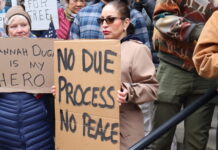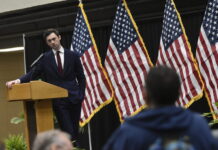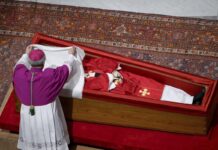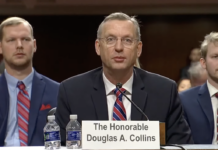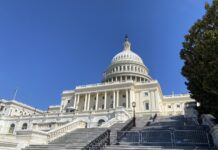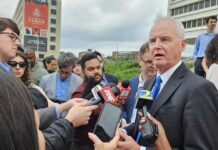
LAS VEGAS (Nevada Current) — The Green Beret who shot himself seconds before the Tesla Cybertruck he rented went up in a fiery explosion outside Trump International Hotel in Las Vegas on New Year’s Day referred to the event as “a wake up call” and effort to rid himself of the “burden” of the lives he took in combat.
“Fellow Servicemembers, Veterans and all Americans, TIME TO WAKE UP! We are being led by weak and feckless leadership who only serve to enrich themselves,” Matthew Livelsberger wrote on one of two iPhones retrieved from the vehicle, in what police call a journal detailing his preparations in the ten days leading up to his suicide.
Evidence reviewed by police thus far “scratches the surface” of the information retrieved by investigators, Clark County, Nevada, Sheriff Kevin McMahill said at a news conference Friday. Police are expected to make the information available to the public.
“We are the United States of America, the best country people to ever exist! But right now we are terminally ill and headed towards collapse,” reads a second entry. “This was not a terrorist attack, it was a wake up call. Americans only pay attention to spectacles and violence. What better way to get my point across than a stunt with fireworks and explosives? Why did I personally do it now? I needed to cleanse my mind of the brothers I’ve lost, and relieve myself of the burden of the lives I took.”
“We are also aware that there were potential other family issues or personal grievances in his own life that may have been contributing factors,” FBI Special Agent in Charge Spencer Evans told reporters.
He added that law enforcement learned through interviews that Livelsberger suffered from post-traumatic stress disorder and had “no animosity toward the president-elect.”
Authorities have found no definitive connection between Livelsberger and the perpetrator of the New Orleans Bourbon St. massacre on New Year’s Day.
McMahill observed that the highly decorated soldier who served five tours of combat was “not much different” than the officers at the Las Vegas Metropolitan Police Department, and noted the department’s focus on “taking care of the heart, mind, body and soul of the people that are out there doing this work because they’re exposed to things, they see things, they hear things, they feel things, and they smell things that most normal people don’t have to do. And the heroes that are serving in the military and on the front lines of America’s policing are challenged that way.”
The incident, he said, is a reminder to “pay attention to what mental health in America looks like” and a reminder of the “need to talk about these things.”


